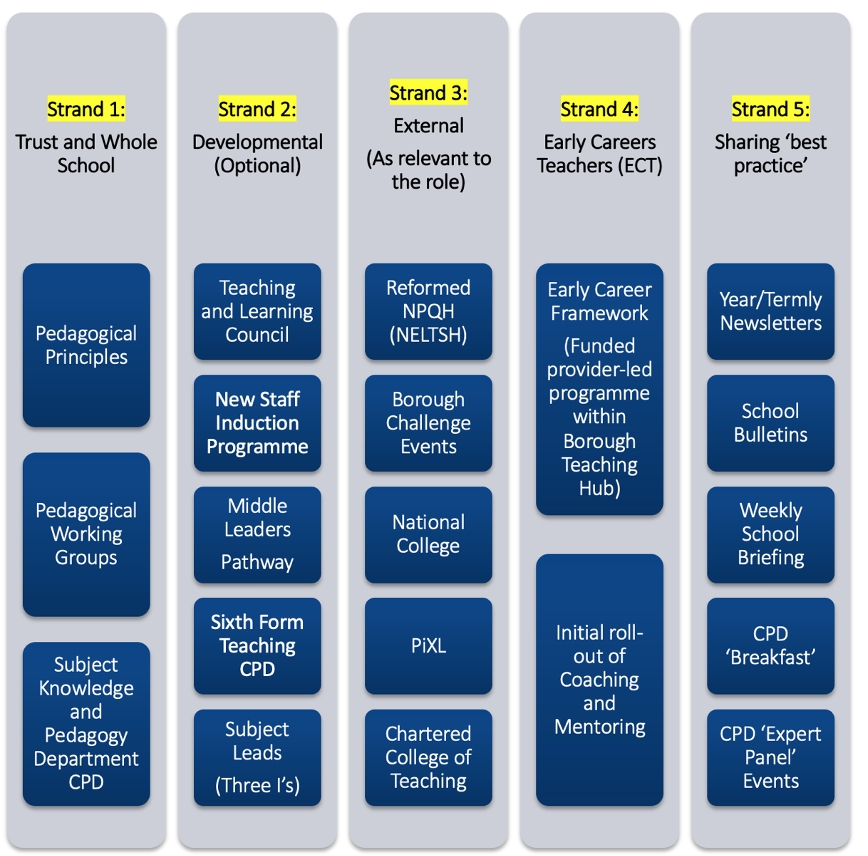This is the second of two posts which will outline and explain our CPD model in order to support anyone else currently going through a similar process. This has been a year long project for us (which is still ongoing in parts) and the start of the process to revamp our CPD offer.
The two posts will address the following:
- Rationale and planning behind the CPD model and plan
- The CPD model ‘in action’ – what do the strands mean in practice?
Part One can be found here.
Part 2: The CPD model ‘in action’ – what do the strands mean in practice?
As outlined in Part One, below is our proposed CPD Plan for 2021-22:

We decided upon a ‘Five Strand’ approach to our CPD model in order to clearly divide the whole school nature of our CPD offer against school priorities with teacher autonomy and choice.
This post will attempt to explain and break down each strand in detail to show the aims and intention of the CPD model ‘in action’.
Strand 1: Alongside the Teaching and Learning Council and stakeholders, our set of Great Teaching Pedagogical Principles was created and this was broken down into eight components. These are driven by research, collaboration between staff and experiences within the profession and these principles have been identified and agreed representing a set of common features that, typically, produce high-quality teaching. The Principles are not a checklist or prescriptive and there is no requirement that every lesson should be framed around all eight but they will form the basis of quality assurance measures to further support a shared staff Teaching and Learning language moving forward.


The Principles are to be launched in Autumn 1 and will be present in all CPD structures to help ensure a consistency of excellence across all classrooms and to ensure understanding. In each Half Term, an amalgamation of these principles will form the basis of a whole school focus to ensure these are understood and embedded into school practice. The matched Principle to the Half Term can be found below.

These Half Termly foci will directly ‘infiltrate‘ a number of different CPD structures and Teaching and Learning programmes within that half term. This may include departmental reflection and analysis of their existing work with the principle in the subject, our weekly briefings, Breakfast CPD and Expert Panel events (written about these here) and sharing best practice mechanisms (Strand 5) above to ensure that each component is understood as we move throughout the year. For example, in Spring 1, our Breakfast CPD and Expert Panel events will be linked to Knowledge, Deliberate Practice and Feedback as that’s the focus. Likewise, in Summer 1, our weekly briefings Teaching and Learning section will revolve around Metacognition and Self-Regulation. Each CPD structure in the Half Term will therefore have an overarching theme to ensure we are revisiting the focus in a number of different ways driven by different members of staff. This will help ensure that the Principles are embedded into school practice.
As part of our QA measures, it is planned to have three Learning Walks across the year. These directly match up to the school priorities (SEND, Assessment and Literacy next year) and in turn, these directly match up to the Half Termly foci outlined above. In order to support and prepare staff for these Learning Walks, Pedagogical Working Groups will be set up relating to the bullet points below within the Learning Walk focus. For example in Spring 2, there will be a Learning Walk on Assessment. This has been selected and placed here to match up to the Half Term Focus of Knowledge, Deliberate Practice and Feedback and Modelling and Questioning. Therefore, in Spring 2, there will be Pedagogical Working Groups set up immediately prior to the Learning Walk on ‘Formative and Summative’, ‘Retrieval and Memory’, ‘Questioning strategies’ and ‘Feedback’. Because different members of one department may be in different Working Groups, there is a department meeting after this to allow staff to feedback to each other and exchange ideas and strategies. This will ensure staff are supported before the Learning Walk occurs and that they are prepared in terms of their knowledge levels and strategies. Therefore, Learning Walks are not judgemental but an avenue for staff to develop their teaching within that particular whole school focus and share best practice.

Lastly within Strand 1, two meetings within our half term meeting structures are given over to departments and one is principally protected for ‘Subject Knowledge and Pedagogy Department CPD‘. The purpose of this is to improve and support teachers’ subject and pedagogical knowledge in their department. Improved subject knowledge has been shown to have one of the biggest differences to students’ outcomes. Effective CPD needs to utilise departmental CPD and training and subjects leads empowered to deliver this. An option list to support HODs will be sent out at the start of the year. Within this, training could include:
- Subject specific discussions around the Half Term focus
- Departmental discussions around research literature
- Subject knowledge enhancement discussions and training
- Curriculum planning
- Using external organisations and agencies
Strand Two: We set up our Teaching and Learning Council this year to create the above Pedagogical Principles but for the next academic year, we aim to give them enhanced responsibilities:
- Leading and presenting in the Breakfast CPD programme and Expert Panel CPD Events (not exclusive). The focus of these sessions directly tie in with the Half Termly focus (see above).
- Playing an active role in disseminating research and creating an Action Plan on a whole school priority.
- Contribute to sharing best practice within Teaching and Learning in newsletters, briefings and bulletins (Strand 5).
- Aid in QA measures including Learning Walks and observations.
- Membership to the Charted College of Teaching.
The Teaching and Learning Council is not selective and teachers apply to join the Council with a small statement of intent. We aim to have 10-12 members on the Council at any one time.
The New Staff Induction programme will be delivered in the Autumn Term and will support staff in understanding our ethos, vision, policies and priorities. It will cover the following topics (not exhaustive).
- Culture, Vision, Ethos
- Behaviour Management and Classroom Routines
- Safeguarding
- Health and Safety
- SEND, EAL and using a TA
- Teaching and Learning Priorities, Routines and Pointers
- Professional Growth and Staff Development
- Microsoft Teams
- Data Systems
- The Pastoral Environment
The Sixth Form Teaching CPD will be delivered by our AP Head of Sixth Form and represent three sessions across the year for current and aspiring KS5 teachers.
The Middle Leaders Pathway aims to support and develop current and aspiring Middle Leaders and is based upon the existing NPQML. The course will also utilise Adam Robbins’ Middle Leadership Mastery and copies have been purchased for all course participants. This will occur on a Thursday (our CPD ‘day’ is a Wednesday).


Finally, the Subject Leads (Three I’s) programme represents our existing SLs meetings and will have a heavy focus on implementation next year due to the Pedagogical principles and our whole school foci of Assessment, SEND and literacy. They will also be based around Kat Howard and Clare Hill’s Symbiosis: The Curriculum and the Classroom.

Strand Two is the optional pathway allowing choice and autonomy, aside from the more prescriptive nature of Strand One.
Strand Three: This gives staff membership and access to online courses and external providers listed above. We also access and use the Borough Hub for further courses, training and collaboration with partner schools.
Strand Four: We have partnered with our local Teaching Schools Hub for the Early Career Framework (ECF). In a whole school sense, we will use the mentors identified to support our initial roll-out of coaching in the next academic year.
Strand Five: As part of our continued push to share best practice, support one another and ensure a ‘buzz’ around Teaching and Learning, the following mechanisms will be used:
- A Termly Teaching and Learning newsletter
- School Briefings with Teaching and Learning Tips
- School Bulletin sharing Teaching and Learning Tips and reading
- Breakfast CPD programme and Expert Panel CPD Events
- Teaching and Learning Half Term calendar
- Teaching and Learning noticeboard
- The use of external speakers and events within our programmes
- Teaching and Learning assemblies for students
- Surveys shared with staff throughout the year to gauge areas of strengths and areas to reflect upon and develop
What is the proposed plan for our meeting schedule in the next academic year?
This is based upon a six week half term and is a cyclical meeting structure that attempts to link together all of the work above. Our CPD meeting slot is Wednesday.
In Week 1, we will communicate the Half Term focus based around the Principles (explained above) and, where possible, communicate any feedback from the previous Learning Walk.
In Week 2, we prioritise time for the Subject Leads Meeting.
In Week 3, we have our first Department Meeting and it acts as protected time for Subject Knowledge and Pedagogy CPD. After the communication of the focus in Week 1, departments will reflect on their strengths and areas for improvement within this principle, discuss and support plan for the upcoming Learning Walk, have discussions around the curriculum and subject knowledge or use the time for external subject specific training.
In Week 4, we have either the Pedagogical Working Groups if its a Half Term that has a Learning Walk (Autumn 2, Spring 2 or Summer 2 shown above) or an Expert Panel CPD Event led by staff members based around the Half Termly focus linked to the Principles.
In Week 5 (generally the Learning Walk week), there is Whole School Training based around Safeguarding requirements or Trust and Inclusion work for example. This represents national requirements. The Sixth Form Teaching CPD programme will also occur during this week.
In Week 6, there is another Department Meeting which can be used for Subject Knowledge and Pedagogy CPD but also is a reflective meeting on the Learning Walk in that half term (if there was one), feedback and reflection of the Working Groups or the Expert Panel CPD event. It will also enable departments to ensure plans and discussions are in place for the next Half Term.




Hi,
I’ve just been reading some of your blog, and wondered if you’re available to commission for articles?
I’m the Marketing Manager here at Doddle and we’ve just started publishing a quarterly magazine called Innovation in Education http://doddlelearn.co.uk/innovation-in-education-magazine/. The magazine’s aim is to publish thought provoking articles that explore new ideas and approaches, that help teachers improve in the classroom and beyond. This could be anything from tips on lesson planning or curriculum organisation to people management and whole-school improvement.
If this sounds like something you would be interested in, then I’d love to speak more with you. You can email me directly at innovation@doddlelearn.co.uk
LikeLike